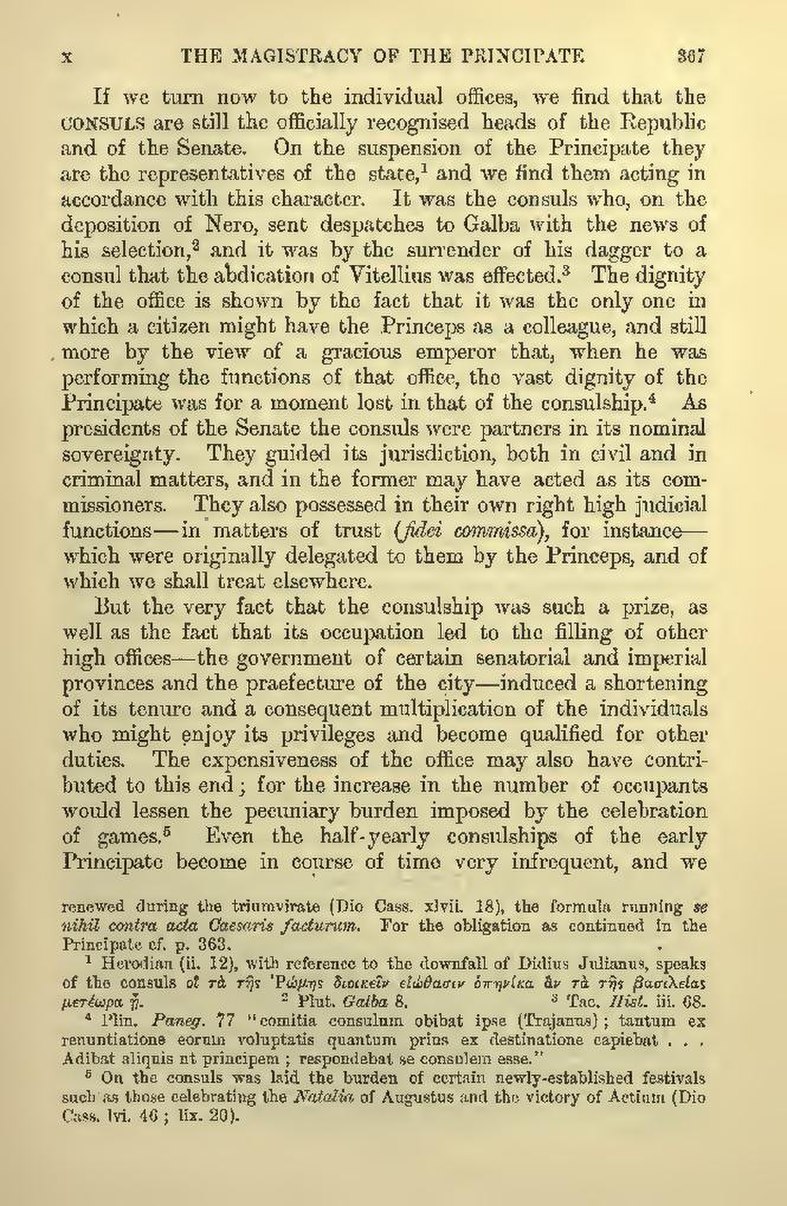If we turn now to the individual offices, we find that the CONSULS are still the officially recognised heads of the Republic and of the Senate. On the suspension of the Principate they are the representatives of the state,[1] and we find them acting in accordance with this character. It was the consuls who, on the deposition of Nero, sent despatches to Galba with the news of his selection,[2] and it was by the surrender of his dagger to a consul that the abdication of Vitellius was effected.[3] The dignity of the office is shown by the fact that it was the only one in which a citizen might have the Princeps as a colleague, and still more by the view of a gracious emperor that, when he was performing the functions of that office, the vast dignity of the Principate was for a moment lost in that of the consulship.[4] As presidents of the Senate the consuls were partners in its nominal sovereignty. They guided its jurisdiction, both in civil and in criminal matters, and in the former may have acted as its commissioners. They also possessed in their own right high judicial functions—in matters of trust (fidei commissa), for instance—which were originally delegated to them by the Princeps, and of which we shall treat elsewhere.
But the very fact that the consulship was such a prize, as well as the fact that its occupation led to the filling of other high offices—the government of certain senatorial and imperial provinces and the praefecture of the city—induced a shortening of its tenure and a consequent multiplication of the individuals who might enjoy its privileges and become qualified for other duties. The expensiveness of the office may also have contributed to this end; for the increase in the number of occupants would lessen the pecuniary burden imposed by the celebration of games.[5] Even the half-yearly consulships of the early Principate become in course of time very infrequent, and we
- [Footnote: renewed during the triumvirate (Dio Cass. xlvii. 18), the formula running se
nihil contra acta Caesaris facturum. For the obligation as continued in the Principate cf. p. 363.].]
- ↑ Herodian (ii. 12), with reference to the downfall of Didius Julianus, speaks of the consuls [Greek: hoi ta tês Rhômês dioikein eiôthasin hopênika an ta tês basileias meteôra hê
- ↑ Plut. Galba 8.
- ↑ Tac. Hist. iii. 68.
- ↑ Plin. Paneg. 77 "comitia consulum obibat ipse (Trajanus); tantum ex renuntiatione eorum voluptatis quantum prius ex destinatione capiebat. . . . Adibat aliquis ut principem; respondebat se consulem esse."
- ↑ On the consuls was laid the burden of certain newly-established festivals such as those celebrating the Natalia of Augustus and the victory of Actium (Dio Cass. lvi 46; lix. 20).
